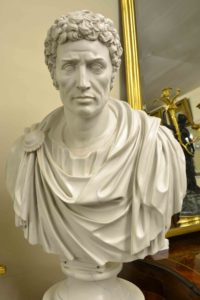
| Full Name: Lucius Appuleius Saturninus | |
| Age: born in 135, 35 years old | |
| Birthday: December 10 | |
| Class: Plebeian | |
| Tribe: Collina | |
| Position: Tribune of Plebs | |
| Situation:
Political relationship with Marius |
|
| Motivation:
To be the most powerful man in Rome |
APPEARANCE
| Height |
|
| Body type / Build |
|
| Skin tone |
|
| Hair (style & color) |
|
| Eyes |
|
| Facial description |
|
| Prominent features or distinguishing marks |
|
| Style of dress |
|
| Mannerisms or gestures |
|
| Health |
|
SPEECH
| Tone of voice
loud, quiet, harsh, etc. |
|
| Language or accent |
|
| Favorite phrases |
|
BEHAVIOR
| Personality |
|
| Strengths | Has a brilliant mind, a sharp tongue, and the ability to win people over with his charismatic charms. |
| Weaknesses | Politically, he has very few, except his completely unbending nature, and his inability to reconcile with those who see things differently than him. He doesn’t know the meaning of compromise. |
| Hobbies | He enjoys games of riddles. He is fascinated with language and the tricks they can play |
| Ambition | To be the most renowned, feared, respected, and loved man in Rome. |
| Greatest fear | He gives very little thought to fears, but in his heart of hearts he fears having to kneel to another man, to admit before others that he is not the greatest man in Rome. |
| Biggest secret | How deeply he was hurt by his wife’s abandoning him. |
| How does this character get along with other characters? | Those that agree with him, perfectly. Those that disagree, well he could care less, but he makes his stances clear in such a way that alienate others. To an insulting degree. |
| Most Comfortable When | Speaking from the Rostra |
| Ideology | That power, glory, and fame, are the only thing that make such a dreary and pointless existence meaningful. |
| Embarrassment | Being removed from his position as Quaestor, and his wife leaving him for a wealthier, more aristocratic man. |
| Prejudices | He hates the wealthy, the aristocracy. He blames them for his own woes, as well as the peoples’, and doesn’t care to show it. |
| Political party and beliefs | Populares |
| Religion and superstitions | He is not religious at all. |
| Reaction to Stress or hardships | Calm and collected |
| Quirks | Direct eye contact, piercing eye contact. And he wears a furtive smile even when being attacked or belittled, as if imagining how he will repay the man in full who is doling them out. |
| Short term goal | To earn his next tribuneship |
| Long term goal |
|
BACKGROUND
| Where born/grew up |
|
| Important past events |
|
| Family background |
|
| Saddest Memory |
|
| Happiest Memory |
|
| Education |
|
| Proudest accomplishment |
|
| Previous Occupations |
|
RELATIONSHIPS
| Friends | He is loyal, and a kind friend. He is willing to talk about pedestrian manners in the same attentive manner as he does politics. |
| Enemies | Cordial, but his words remain poignant and offensive. He does not spare words. |
| Parents | His parents were staunch conservatives, as he was raised to be, and he jests that were they still living in Rome they’d be knocking down his door, but they were “withering away on some sea side villa in Baiae or the like”. |
| Siblings | None |
| Spouse | None, since his wife Licinia left him to marry Cato Salonicus |
| Children | None, had a daughter that died in childbirth, just before his wife left him |
| Distant Relatives | Most of them remain opposed to his politics, and he sees those who are not with him as against him |
| Superiors | He sees no man as his superior, and treats them with the same decencies as he treats his equals or those beneath him. Nothing more, nothing less. |
| Subordinates | Cordial. He treats his slaves as property, not being overly harsh to them, but also not thanking them or pandering to them when they perform well. |
| Mentors | He considers no man his mentor. Even Marius, he sees as a tool to be used. He allows the man to see himself as a kind of mentor, but in truth Saturninus knows he is intellectually superior. |
| Colleagues | See above |
| How does he think others perceive him? | He knows how others see him, as a radical and a demagogue. Others see him as the savior of Rome. “I’m keen enough to see the truth is somewhere in the middle”. |
FAVORITES
| Food | Loves honeyed dormouse and savory flamingo tongue |
| Drink | Drinks well watered wine, never to intoxication, except before his end |
| Author, poet, philosopher | Enjoys the work of Terrance, particularly his wit |
| Sport | He enjoys the races, but only because of the positive effects they bring. He has no favored team and bets on no gladiators |
| Environment | The Rostra. No where compares. He is in his element when speaking (or performing, in his way) before a crowd |
| Locations | Rome. He is not meant for rural life, and never even considers retirement |
| Historical Figure | The Gracchi twins |
| God or goddess | He is completely irreligious. He maintains appearances, but privately doesn’t hide the fact that he believes there are no gods. |

